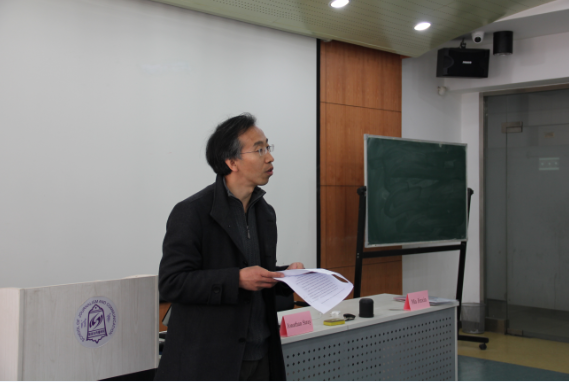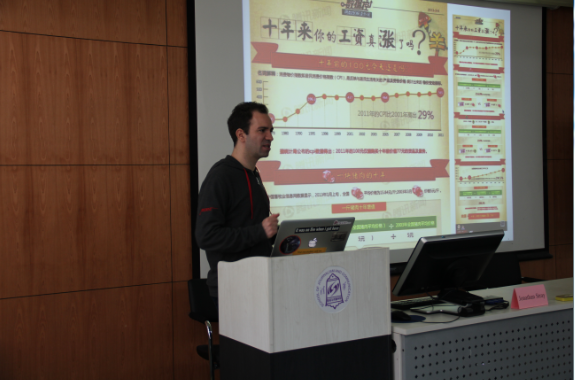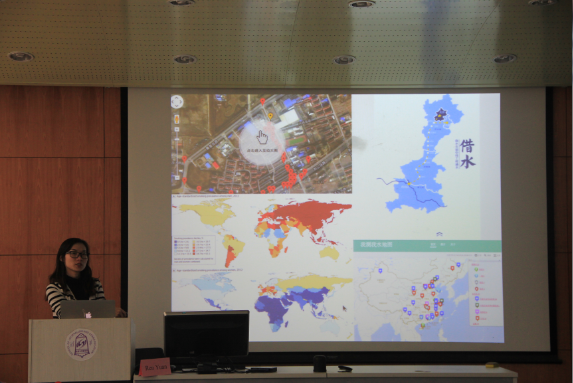Faculty members in Tsinghua University’s School of Journalism and Communication became students again for a week in April, and the results are sure to benefit Tsinghua journalism students for years to come.
The intensive, five-day workshop on data journalism was co-sponsored by the Tsinghua School of Journalism and Communication and IREX, a U.S.-based public policy organization committed to international education in academic research, professional training and technical assistance.

“In today's rapidly changing journalism and communications world, it is a compelling, if not mandatory, trend that both media professionals and journalism educators need to reflect our knowledge and skill structures in order to catch up with the ongoing trend of revolutionary transformation", said TSJC Administrative Dean Jin Jianbin, who participated throughout the workshop. “We need to re-equip ourselves in order to better equip our students so that they can begin their career in media industry more smoothly after they graduate from journalism schools.”
Among the distinguished journalists who “trained the trainers” were Jonathan Stray, a data journalism professor at Columbia University and a veteran data journalist for ProPublica.org and the Associated Press, Ma Jinxin, an experienced trainer for IREX and DJChina.org, three digital experts from Caixin Media, and Rick Dunham, co-director of the Global Business Journalism Program at Tsinghua and a professor of data journalism and multimedia business reporting. Sarah Bushman coordinated the program for IREX.

Tsinghua faculty members participating in the sessions from April 13 to 17 included Administrative Dean Jin Jianbin, Associate Deans Chen Changfeng and Cui Baoguo, plus Global Business Journalism Program co-director Hang Min and Professor Shen Yang and director of MA program in International Journalism Zhou Qingan. Also attending the sessions were some graduate students from Tsinghua’s Global Business Journalism and International Journalism programs.
Professor Stray described data journalism as a form of journalism that combines traditional reporting skills with social science techniques, an engineering and programming mindset, strong storytelling skills, and an ability to visualize and communicate information.
“Now we have new methods for coming up with information,” he said. “It’s not like writing a novel. It’s not like building a car. It’s something that requires both sets of skills.”
Dean Jin said it was imperative that journalism professors learn data journalism skills because longstanding journalism models now face “radical change and restructuring.”
“Data journalism is not new, but it did become much more prominent with the surge of social media platforms, which changed the whole media ecology from content production to the way of content sharing, dissemination and consumption,” he said. “It is under such recognition that many J-Schools across the globe have been keenly embracing the trend of data journalism, because it is a question of ‘to be or not to be.’”
The instructors explained best practices used by data journalists across the world. Ma Jinxin described how the New York Times had been a leader in using data visualization with in-depth projects and the Guardian in Great Britain had pioneered the use of data with breaking news, such as its interactive maps of riots in Manchester, England. The Caixin experts explained how the respected Chinese business publication had harnessed the power of data to cover the 2013 chemical explosion in Qingdao and the web of corruption charges enveloping Zhou Yongkang. The trainers explained that journalists should learn how to serve the public by using data to go beyond the simple repetition of basic public information.

“Information, anyone can get,” Professor Stray said. “The journalist’s job is getting more sophisticated.”
Professor Dunham, who has used data in his reporting in the United States since 1981, predicted a future of journalism in which data-based stories would be more interactive, more mobile, more ambitious and less expensive to produce. More young journalists will have advanced data skills and more young programmers will learn journalism skills, he predicted. He said that universities like Tsinghua, which are strong in journalism, engineering and computer programming education, have an opportunity to lead the way.

“Data journalism allows us to shed light on important subjects and to explain complicated information in understandable, accessible and more attractive ways,” he said.
The Tsinghua faculty members received certificates at the conclusion of the five-day program on April 18. Dean Jin called the challenging week “a very fruitful and rewarding experience for all of us.”

